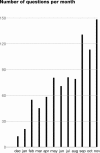Advice from a medical expert through the Internet on queries about AIDS and hepatitis: analysis of a pilot experiment
- PMID: 16796404
- PMCID: PMC1483911
- DOI: 10.1371/journal.pmed.0030256
Advice from a medical expert through the Internet on queries about AIDS and hepatitis: analysis of a pilot experiment
Abstract
Background: Advice from a medical expert on concerns and queries expressed anonymously through the Internet by patients and later posted on the Web, offers a new type of patient-doctor relationship. The aim of the current study was to perform a descriptive analysis of questions about AIDS and hepatitis made to an infectious disease expert and sent through the Internet to a consumer-oriented Web site in the Spanish language.
Methods and findings: Questions were e-mailed and the questions and answers were posted anonymously in the "expert-advice" section of a Web site focused on AIDS and hepatitis. We performed a descriptive study and a temporal analysis of the questions received in the first 12 months after the launch of the site. A total of 899 questions were received from December 2003 to November 2004, with a marked linear growth pattern. Questions originated in Spain in 68% of cases and 32% came from Latin America (the Caribbean, Central America, and South America). Eighty percent of the senders were male. Most of the questions concerned HIV infection (79%) with many fewer on hepatitis (17%). The highest numbers of questions were submitted just after the weekend (37% of questions were made on Mondays and Tuesdays). Risk factors for contracting HIV infection were the most frequent concern (69%), followed by the window period for detection (12.6%), laboratory results (5.9%), symptoms (4.7%), diagnosis (2.7%), and treatment (2.2%).
Conclusions: Our results confirm a great demand for this type of "ask-the-expert" Internet service, at least for AIDS and hepatitis. Factors such as anonymity, free access, and immediate answers have been key factors in its success.
Conflict of interest statement
Figures




Similar articles
-
Information needs and visitors' experience of an Internet expert forum on infertility.J Med Internet Res. 2005 Jun 30;7(2):e20. doi: 10.2196/jmir.7.2.e20. J Med Internet Res. 2005. PMID: 15998611 Free PMC article.
-
An ask-the-expert service on a rheumatology web site: who were the users and what did they look for?Arthritis Care Res (Hoboken). 2011 Apr;63(4):604-11. doi: 10.1002/acr.20399. Arthritis Care Res (Hoboken). 2011. PMID: 21452271
-
What are patients seeking when they turn to the Internet? Qualitative content analysis of questions asked by visitors to an orthopaedics Web site.J Med Internet Res. 2003 Oct 10;5(4):e24. doi: 10.2196/jmir.5.4.e24. J Med Internet Res. 2003. PMID: 14713652 Free PMC article.
-
Reasons for consulting a doctor on the Internet: Web survey of users of an Ask the Doctor service.J Med Internet Res. 2003 Oct 22;5(4):e26. doi: 10.2196/jmir.5.4.e26. J Med Internet Res. 2003. PMID: 14713654 Free PMC article.
-
[Austrian AIDS counseling: responsibilities and strategies].Wien Klin Wochenschr. 1990 Jan 19;102(2):58-62. Wien Klin Wochenschr. 1990. PMID: 2408244 Review. German.
Cited by
-
Text mining and natural language processing approaches for automatic categorization of lay requests to web-based expert forums.J Med Internet Res. 2009 Jul 22;11(3):e25. doi: 10.2196/jmir.1123. J Med Internet Res. 2009. PMID: 19632978 Free PMC article.
-
An online network tool for quality information to answer questions about occupational safety and health: usability and applicability.BMC Med Inform Decis Mak. 2010 Oct 22;10:63. doi: 10.1186/1472-6947-10-63. BMC Med Inform Decis Mak. 2010. PMID: 20969777 Free PMC article.
-
Is There a Weekly Pattern for Health Searches on Wikipedia and Is the Pattern Unique to Health Topics?J Med Internet Res. 2015 Dec 22;17(12):e286. doi: 10.2196/jmir.5038. J Med Internet Res. 2015. PMID: 26693859 Free PMC article.
-
An online expert network for high quality information on occupational safety and health: cross-sectional study of user satisfaction and impact.BMC Med Inform Decis Mak. 2011 Nov 23;11:72. doi: 10.1186/1472-6947-11-72. BMC Med Inform Decis Mak. 2011. PMID: 22111587 Free PMC article.
-
Factors Associated with Health Information Seeking, Processing, and Use Among HIV Positive Adults in the Dominican Republic.AIDS Behav. 2017 Jun;21(6):1588-1600. doi: 10.1007/s10461-016-1569-5. AIDS Behav. 2017. PMID: 27714522 Free PMC article.
References
-
- UNAIDS/WHO. UNAIDS/WHO (2005) AIDS Epidemic Update: December 2005; 2005.
-
- Registro nacional de casos de sida. Registro nacional de casos de sida (2005) Vigilancia epidemiológica del Sida en España. 2005
-
- Roca B, Suarez I, Gonzalez J, Garrido M, de la FB, et al. Hepatitis C virus and human immunodeficiency virus coinfection in Spain. J Infect. 2003;47:117–124. - PubMed
Publication types
MeSH terms
LinkOut - more resources
Full Text Sources
Medical

